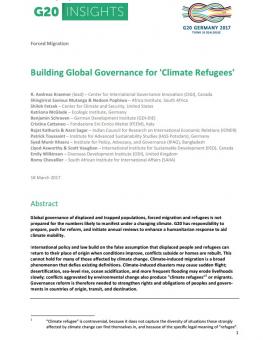
Building Global Governance for 'Climate Refugees'
IISD President-CEO Scott Vaughan and IISD Board Member Lloyd Axworthy, along with several representatives from various environmental NGOs, contributed to this G20 Insights policy brief on recognizing that forced displacement due to climate change is increasing.
IISD President-CEO Scott Vaughan and IISD Board Member Lloyd Axworthy, along with several representatives from various environmental NGOs, contributed to this G20 Insights policy brief on recognizing that forced displacement due to climate change is increasing.
Abstract
Global governance of displaced and trapped populations, forced migration and refugees is not prepared for the numbers likely to manifest under a changing climate. G20 has responsibility to prepare, push for reform, and initiate annual reviews to enhance a humanitarian response to aid climate mobility.
International policy and law build on the false assumption that displaced people and refugees can return to their place of origin when conditions improve, conflicts subside or homes are rebuilt. This cannot hold for many of those affected by climate change. Climate-induced migration is a broad phenomenon that defies existing definitions. Climate-induced disasters may cause sudden flight; desertification, sea-level rise, ocean acidification, and more frequent flooding may erode livelhoods slowly; conflicts aggravated by environmental change also produce "climate refugees"1 or migrants. Governance reform is therefore needed to strengthen rights and obligations of peoples and governments in countries of origin, transit, and destination.
1 "Climate refugee" is controversial, because it does not capture the diversity of situations those strongly affected by climate change can find themselves in, and because of the specific legal meaning of "refugee".
Abstract retreived from www.g20-insights.org.
Participating experts
You might also be interested in
February 2025 | Carbon Minefields Oil and Gas Exploration Monitor
In January 2025, 77 oil and gas exploration licences were awarded in seven different countries, with Norway leading in terms of embodied emissions.
Reforming Environmentally Harmful Subsidies
This playbook offers a strategic framework for philanthropic organizations to understand, engage, and advance environmentally harmful subsidies reform as a critical avenue for sustainable environmental and economic transformation.
State of the Sector: Critical energy transition minerals for India
This report presents a comprehensive strategy for securing a reliable supply of critical energy transition materials (CETMs) essential to India's clean energy and low-carbon technology initiatives.
"Electrify, Baby, Electrify": In 2025, governments must choose a safer world
President Trump campaigned on the slogan “drill, baby, drill,” yet, the case for transitioning from fossil fuels to clean energy has never been stronger.